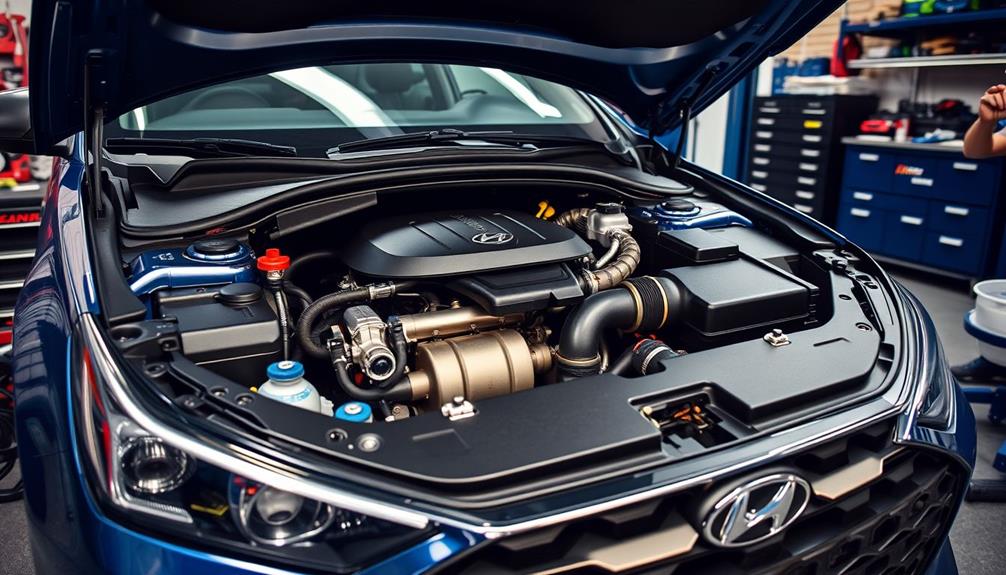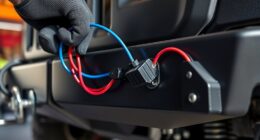Tuning your 2020 Hyundai Elantra can greatly boost both performance and style. By adjusting the ECU, you can release up to 15% more power and improve your fuel efficiency. Popular methods include performance chips and air intake modifications, which provide noticeable gains. Aesthetic upgrades, like custom wheels and vibrant LED lights, enhance your sedan's look. Make sure you follow proper installation processes and keep maintenance on track to enjoy the benefits fully. Plus, understanding warranty implications is essential. There's a lot more you can explore to maximize your Elantra's potential and express your individuality on the road.
Key Takeaways
- Tuning the 2020 Hyundai Elantra can enhance engine performance by up to 15% in power and fuel efficiency.
- Common tuning methods include ECU re-mapping, performance chip modules, and piggyback devices for optimal results.
- A short ram air intake can improve airflow, contributing to approximately a 10% power boost.
- Aesthetic modifications like custom alloy wheels and LED underglow lights can enhance the Elantra's visual appeal.
- Engaging with the tuning community provides insights and support for better decision-making and maintenance practices.
Understanding Tuning Basics
When it comes to tuning your 2020 Hyundai Elantra, understanding the basics is essential for optimizing your vehicle's performance. The core of tuning involves adjusting the engine's computer settings, specifically through an ECU tune, to enhance metrics like horsepower and torque output. You can achieve improvements of up to 15% in MPG efficiency, making it a worthwhile consideration.
The stock ECU in newer Elantras has inherent limitations, often reducing power through torque limiting. This is where tuning becomes necessary. Common methods include ECU re-mapping or using piggyback devices, which can modify the stock ECU's behavior without requiring internal engine changes.
However, before diving into tuning, keep in mind that modifications could void your warranty. It's important to understand your dealership's policies regarding tuning and how it might impact warranty claims.
Additionally, regular maintenance—like timely spark plug changes and using high-quality fuel—is essential for reaping the full benefits of your tuning efforts. By grasping these basics, you'll be better prepared to make informed decisions that can greatly enhance your Elantra's performance.
Key Performance Enhancements

To boost your 2020 Hyundai Elantra's performance, several key enhancements can make a remarkable difference.
One of the most effective options is tuning with a DTE or RaceChip, which can provide power gains of up to 15% in both horsepower and torque.
If you're looking for a simpler modification, installing a short ram air intake can increase airflow, resulting in power boosts of about 10% for earlier models.
ECU tuning is another powerful enhancement that not only improves overall power output but can also enhance fuel efficiency, potentially saving you up to 4 MPG while reducing throttle lag.
If you want to play it safe and keep your warranty intact, consider using piggyback modules like the Lap3 ProTuner. These allow you to adjust ECU settings without permanently altering your vehicle's original configuration.
Additionally, adding a performance chip module can reveal hidden engine potential for your Elantra, often available for as low as $99.99.
This enhancement can greatly improve driving dynamics and responsiveness, providing noticeable power gains that elevate your driving experience.
Popular Tuning Options

Exploring popular tuning options for your 2020 Hyundai Elantra can greatly enhance its performance without requiring extensive modifications. Some popular tuning options for the 2020 Hyundai Elantra include upgrading the air intake system, installing a performance exhaust, and tuning the engine for optimal power delivery. These modifications can greatly enhance the vehicle’s performance, while also enhancing power and style. By making these adjustments, drivers can enjoy a more responsive and powerful driving experience without the need for extensive modifications.
For the Elantra GT N Line (1.6t), devices like DTE and Race Chip are excellent choices, boosting engine performance effectively. Piggyback devices such as the Lap3 ProTuner and JB4 provide reliable power increases while keeping safety and performance limits in check.
Since 2017, ECU tuning has become less effective due to stock ECU limitations, making quality piggyback modules a preferred option for power enhancement. If you're seeking tailored performance gains, consider full flash tunes, which cater specifically to your vehicle's needs.
Keeping the original ECU can also help mitigate warranty risks associated with modifications.
However, it's essential to approach these popular tuning options with caution. Modifying your vehicle may void warranties, and different dealerships have varied policies regarding modifications.
Always check your dealership's stance before proceeding with any tuning options. By carefully selecting the right enhancements, you can enjoy improved performance in your Hyundai Elantra while minimizing any potential drawbacks.
Aesthetic Modifications

Aesthetic modifications can transform your 2020 Hyundai Elantra into a head-turning ride that reflects your personal style. One great way to modernize your dashboard is by adding a digital speed display. It not only enhances the sleek look of your interior but also makes speed metrics easier to read.
To elevate your Elantra's visual appeal at night, consider installing LED or neon underglow lights, creating an eye-catching presence. Upgrading to custom alloy wheels can also boost aesthetics while improving performance by reducing weight and enhancing handling.
If you want to add a sporty touch, incorporating a rear spoiler or diffuser can create a more aggressive stance and potentially improve aerodynamics.
For a unique look without permanent changes, high-quality vinyl wraps or decals allow for personalized designs, making your Hyundai stand out even more.
These aesthetic modifications won't only enhance the overall look of your Elantra but also guarantee that it truly represents who you are. Embrace these changes, and watch as your sedan transforms into a stylish reflection of your personality.
Installation Tips and Techniques

When you're ready to install tuning modules or performance enhancements on your Hyundai Elantra 2020, having the right tools is essential.
Follow a step-by-step process to guarantee everything fits perfectly and works smoothly.
With the proper preparation, you can achieve impressive results without any hassle.
Installation Tools Required
To achieve a successful tuning installation on your 2020 Hyundai Elantra, you'll need a few essential tools. Start with a basic socket set and screwdrivers, as these are vital for removing and reattaching components. Pliers will also come in handy for gripping and manipulating various parts during the process.
A quality OBD2 scanner is highly recommended. It'll help you read and clear diagnostic trouble codes before and after the installation, guaranteeing your vehicle's ECU is functioning correctly.
Don't forget to grab a torque wrench; it's important for securing bolts to the manufacturer's specifications, which helps prevent damage to components during installation.
Make sure you set up a clean workspace with proper lighting. This will enhance your efficiency and safety, allowing you easy access to the vehicle's engine bay and electronic systems.
Finally, always follow detailed installation instructions specific to the tuning product you choose, such as those provided by RaceChip or similar brands. This will help you avoid common pitfalls and guarantee you achieve peak performance gains.
With the right tools and preparation, you're well on your way to enhancing your Elantra's performance!
Step-by-Step Process
Before diving into the installation process of your 2020 Hyundai Elantra's performance tuning, gather all necessary components, including the performance chip and wiring kit.
Start by reviewing the installation instructions specific to your model.
Next, locate the OBD2 port in your vehicle—it's typically found beneath the steering column.
With your performance chip in hand, follow the Plug&Drive installation principle. Simply connect the chip directly to the OBD2 port, which should only take a few minutes.
Once installed, download the RaceChip app to manage your power enhancements. This app offers different tuning stages: Efficiency, Sport, and Race, allowing you to tailor performance to your driving style.
Before hitting the road, use the Warm-Up Timer feature in the app. This guarantees your engine is ready for full performance, optimizing your driving experience.
Community Feedback and Support

How can engaging with the community enhance your tuning experience for the 2020 Hyundai Elantra? By connecting with fellow enthusiasts, you can gain valuable insights into tuning options and performance enhancements. When you share your experiences and seek advice, you'll find that community feedback can help you make informed decisions about modifications.
Social media platforms like Instagram and dedicated forums allow you to showcase your Elantra's modifications and receive constructive feedback. This interaction fosters camaraderie, making the tuning journey more enjoyable. You'll also discover discussions emphasizing the need to maintain the original ECU to mitigate warranty risks when considering tuning changes.
Moreover, by participating in local car meets or online groups, you can connect with experts and industry professionals. They can guide you in choosing reliable tuning products and steer you away from less supported options that mightn't meet your performance expectations.
Engaging with the community not only enhances your knowledge about safe tuning practices but also helps you build lasting relationships with other Elantra owners. So immerse yourself in the community—your tuning experience will surely benefit from it!
Maintenance After Tuning

After tuning your Hyundai Elantra, sticking to a regular maintenance schedule is essential to keep everything running smoothly.
Don't forget to replace your spark plugs every 30,000 miles to maintain peak engine performance, and keep an eye on your engine's overall health.
Regularly monitoring your engine's performance will help you catch any issues before they escalate.
Regular Maintenance Schedule
Regular maintenance for your tuned 2020 Hyundai Elantra is essential to keep it running at peak performance. One significant aspect of this maintenance is checking and replacing the spark plug approximately every 30,000 miles. Neglecting this can lead to performance issues that could affect your driving experience.
Following your owner's manual for scheduled maintenance is imperative. It helps guarantee both the longevity of your vehicle and the effectiveness of any aftermarket modifications.
After tuning, keep a close eye on your engine oil levels and change the oil as recommended. This supports enhanced performance and prevents unnecessary engine wear.
Additionally, regularly inspect and maintain your cooling system. Tuning increases your car's power output, and an overlooked cooling system can lead to overheating.
Finally, document any modifications made to your Elantra. This is essential for warranty coverage, as some dealers may void it if modifications aren't properly recorded or maintained.
Spark Plug Replacement Guidelines
Spark plugs play a crucial role in the performance of your tuned 2020 Hyundai Elantra, and keeping them in prime condition is important. Following the spark plug replacement guidelines helps maintain peak engine performance, especially after tuning modifications that can increase engine stress. Generally, you should replace your spark plugs every 30,000 miles to avoid issues like misfires and decreased power.
Here's a quick reference table for your spark plug maintenance:
| Maintenance Task | Frequency | Recommended Type |
|---|---|---|
| Spark Plug Inspection | Every 10,000 miles | Standard or Iridium |
| Spark Plug Replacement | Every 30,000 miles | Iridium for tuned cars |
| Performance Check | Every 5,000 miles | Monitor engine response |
| Emission Test | Annually | Guarantee compliance |
If you choose to upgrade to iridium spark plugs, you'll likely experience enhanced performance and longevity. Remember to consult your owner's manual for specific guidelines tailored to your Elantra. Regularly checking and replacing your spark plugs is a simple yet critical part of maintaining your vehicle's efficiency and performance post-tuning.
Monitoring Engine Performance
Maintaining ideal engine performance after tuning requires vigilant monitoring of various metrics. You'll want to keep an eye on your Hyundai Elantra's performance to guarantee everything runs smoothly.
Regularly track these key metrics:
- Horsepower and torque levels
- Fuel efficiency rates
- Throttle response changes
- Error codes from your OBD2 diagnostic tool
- Boost levels, preferably below 22-23 psi
Using an OBD2 tool is essential for spotting any anomalies or error codes that pop up post-tuning. This early detection can help you address potential issues before they escalate.
Additionally, schedule routine maintenance checks, including spark plug replacements every 30,000 miles, to keep your engine in prime shape.
Monitoring engine performance isn't just about numbers; it's about making sure your car remains reliable and enjoyable to drive.
Engage with community forums and seek expert advice to stay updated on best practices. With the right approach, you'll maintain the enhancements from your tuning while guaranteeing your Elantra's performance and longevity remain at their best.
Tuning and Warranty Considerations

When it comes to tuning your 2020 Hyundai Elantra, it's crucial to take into account how modifications might affect your warranty. Modifying your vehicle can potentially void the warranty, especially if your dealership identifies aftermarket parts or tuning changes.
For instance, if you flash tune the ECU, the flash counter may trigger, making it detectable by dealers and risking warranty claims on engine-related issues.
To mitigate these warranty considerations, consider using quality piggyback devices like the Lap3 ProTuner or JB4. These options are generally less likely to be detected by dealerships than full ECU tunes, which helps preserve your warranty coverage.
Another approach is to maintain the original ECU while using a spare ECU for tuning; this can greatly reduce the risks associated with warranty voiding during service visits.
It's also wise to engage with your dealership about their policies on modifications. Different dealerships have varying levels of leniency when it comes to tuning, so understanding their stance can help you make informed decisions about your vehicle modifications without jeopardizing your warranty.
Cost-Effective Modifications

When you're looking to enhance your 2020 Hyundai Elantra without breaking the bank, there are plenty of budget-friendly upgrades available.
Options like a performance air intake system or a Stage 1 OBDII performance chip can give your ride a noticeable boost in power and efficiency.
Plus, exploring DIY modification tips can help you save even more while getting the performance you want.
Budget-Friendly Upgrades
For those looking to enhance their 2020 Hyundai Elantra without breaking the bank, budget-friendly upgrades can make a significant difference in performance.
You don't need to spend a fortune to see improvements; several cost-effective modifications can help you achieve better horsepower, torque, and overall driving experience.
Here are some budget-friendly upgrades you should consider:
- Stage 1 OBDII Module – Release hidden engine potential for $99.99.
- Short Ram Air Intake (2011-2016 models) – Boost horsepower and torque by up to 10% for $89.99.
- Mega Raizin Module – Stabilize the electrical system and get a digital voltage display for just $49.99.
- Cold Air Intake (2017-2019 models) – Gain 5-8 horsepower and improved torque for around $99.95.
- OBD2 Code Reader – Easily diagnose engine issues for $29.95, ensuring your upgrades are performing at their best.
Performance Tuning Options
After exploring budget-friendly upgrades, it's time to look at performance tuning options that can further elevate your 2020 Hyundai Elantra's capabilities.
One of the most effective methods is ECU tuning, which can reveal hidden power and torque, enhancing both performance and fuel efficiency. Utilizing quality piggyback devices like Lap3 ProTuner or JB4 allows you to trick the ECU without voiding your warranty, offering significant power gains without major modifications.
Another cost-effective option is installing a high-flow air intake system, which can boost horsepower and torque by up to 10%. This works especially well in conjunction with ECU tuning, maximizing your performance enhancements.
Additionally, consider performance chip modules, such as Stage 1 or Stage 3 OBDII modules, which provide substantial improvements in engine performance at competitive prices.
For those looking to further refine their Elantra GT N Line, tuning options like DTE and Race Chip can enhance performance while maintaining safety and reliability.
DIY Modification Tips
Transforming your 2020 Hyundai Elantra into a more performance-oriented machine can be both fun and budget-friendly.
With the right DIY modifications, you can greatly enhance power without breaking the bank. Here are some cost-effective options to take into account:
- Short Ram Air Intake: Boost horsepower and torque by up to 10% for around $89.99 to $114.95.
- Stage 1 OBDII Performance Chip: Access hidden engine potential and improve fuel efficiency for just $99.99.
- Voltage Stabilizer: Install a Raizin Voltage Stabilizer for $44.95 to enhance your electrical system's stability.
- Piggyback Tuning Modules: Use options like the Lap3 ProTuner for reliable power increases without extensive modifications.
- Iridium Spark Plugs: Regularly changing to iridium spark plugs at 30,000 miles can greatly enhance engine performance.
Resources for Tuners

Tuning your 2020 Hyundai Elantra GT N Line can be an exciting journey, and having the right resources at your fingertips makes all the difference.
Start by exploring tuning options from reputable brands like DTE and RaceChip, which specialize in ECU remapping and chip tuning. These products can greatly enhance performance by bypassing the stock ECU's torque limitations.
For a safer approach, consider piggyback modules like the Lap3 ProTuner and JB4. These devices allow you to increase power without triggering dealer detection systems, ensuring your modifications remain discreet.
Engaging with the tuning community is another invaluable resource for tuners. Forums and social media groups can provide feedback on various products, helping you make informed decisions about your upgrades.
Don't forget the importance of Customer Service when purchasing tuning products. A responsive support team can assist with installation queries or troubleshooting, ensuring you get the most out of your enhancements.
Finally, maintain regular upkeep of your Elantra, like replacing spark plugs every 30,000 miles, to keep your vehicle performing at its best while tuning.
With these resources, you're well-equipped to elevate your driving experience.
Frequently Asked Questions
Can Hyundai Elantra Be Tuned?
Yes, you can tune your Hyundai Elantra for better performance. Options like piggyback devices and ECU tunes increase power, but be cautious of warranty issues and make certain you monitor boost levels to prevent damage.
What Is Included in a Tune up for a Hyundai Elantra?
A tune-up for your Hyundai Elantra includes changing spark plugs, replacing air filters, and performing oil changes. You'll also check ignition timing, inspect the fuel system, and run diagnostics to guarantee everything's running smoothly.
Can You Tune a Hyundai?
Yes, you can tune a Hyundai. You'll find various options available, like ECU tunes and piggyback devices, but remember to check warranty implications and choose reputable brands to guarantee safe performance enhancements.
What Is the Preferred Engine Size for Hyundai Elantra 2020?
If you're looking for a balance between efficiency and performance in the 2020 Hyundai Elantra, the 2.0L engine is a solid choice. However, if you crave more power, consider the turbocharged options.
Conclusion
To sum up, tuning your 2020 Hyundai Elantra can genuinely elevate both its performance and style, making your driving experience much more enjoyable. Did you know that a well-tuned vehicle can improve fuel efficiency by up to 15%? This means you can enjoy better performance while saving money at the pump. So, whether you're looking for a boost in horsepower or a sleeker look, investing in tuning is a smart move that pays off in more ways than one.









